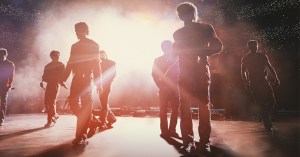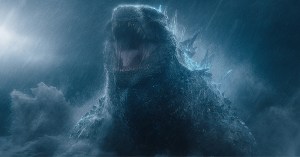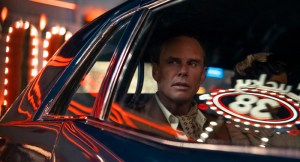Lovecraft Country Star Jonathan Majors Is on the Rise and on the Run in the New Horror Series
The Yale Drama alumni talks about the role that got away — "a kick in the gut" — and his characters' daddy issues.
When Rotten Tomatoes spoke to Jonathan Majors about the connective tissue between his roles, he was pleasantly surprised — “Thanks for watching all my s—.” It shouldn’t be a surprise: Majors’ rise is just beginning. He was introduced to us in the 2017 docudrama series When We Rise, which he shot while still attending Yale School of Drama. Since then, Majors has made his presence known in layered, supporting roles. His breakout performance as Montgomery “Mont” Allen in A24’s The Last Black Man in San Francisco sparked awards buzz and garnered Majors a 2020 Independent Spirit Award nomination for Best Supporting Male. He also appeared in a major role in Spike Lee’s recent hit Netflix film Da 5 Bloods.
Majors is making his transition from supporting to lead, starting with HBO horror series Lovecraft Country, premiering on Sunday. Based on the novel by Matt Ruff, Majors stars as Atticus Black, a Korean War veteran who embarks on a road trip to find his father, who has mysteriously disappeared. The nuanced mix of terrifying sci-fi monsters and terrifying racism in the 1950s Jim Crow era makes for an enthralling experience.
Ahead of the series premiere, we spoke to Majors about playing characters with a military background, Black male relationships on screen, and the one role he wanted but didn’t get.

(Photo by Elizabeth Morris/HBO)
In the beginning of Lovecraft Country episode one, you’re reading Edgar Rice Burroughs’ A Princess of Mars and discuss John Carter’s space to evolve as a character. What’s your opinion about evolving one’s character, and what’s one thing you’ve evolved on?
Jonathan Majors: That’s the second time I read that book. I picked it up again for the role, and that dawned on me, that [John Carter] was a Confederate soldier — I’m from Texas, as you know —and that he had kind of amended that way of thinking. I think it’s quite possible with education. His world had changed. And so he went from this Confederate soldier to a warlord, but his world changed, and the ways in which he was moving through, that had to change in order to grow and to prosper. Ultimately, he was selfish, right? And so you grow and you change for yourself, first and foremost, so you and yours can prosper.
So for myself, for my individual life, I would say I think the greatest amendment from my way of thinking: early on, as a young fellow, it felt as if the world’s out to get me. They’re after you because you’re scrawny — I was very small as a boy. They’re after you because you’re sensitive — I’m still that. I’m no longer scrawny, but I was eager to hide the sensitivity.
But then I get that everybody’s out to get you and that there’s so much pressure on you as a young person, a young Black man, as a young artist. And I think just in the last two or three years that’s kind of shifted for me, and it feels like I’m out to get it, and that pressure that I’m feeling is actually support. And so you can begin to relax some things and put tension in other places in order to move forward.
You’ve spoken about your family’s military background. Over the years, you’ve played characters who’ve served. You also have a knack of situating yourself in wars from different time periods and still add a contemporary element to it. What’s the process of getting into the military mindset for wars of different periods?
Jonathan: That’s a great question. And thanks for watching all my s—. There is a difference, and that difference primarily is what those characters see, that the opposition is different.
For [Corporal Henry Woodson in 2017’s Hostiles], his opposition… looked very much like him; the people were in bondage like his people had been in bondage. That war is different. The conquering of the West, the Indian-American War, that was a different mindset. And all these people have a certain amount of baggage that they bring.
Woodson was the son of a slave, so his vulnerabilities are different than, say, Atticus [in Lovecraft Country]. Atticus came from Chicago, Atticus has always been a free man, and his journey up to that point was that of isolation, even within a majority group. And so he goes to war, he also has to find this video file, so he’s an imaginative character. But in Korea, what you see in Korea, that climate was different, that conflict was different. Or coming out of the Vietnam War. So he has all that stuff bagged up too.
The cheat sheet is they’re people first. First, they’re people and they have all their baggage, they have all their circumstances. And then they enter into the war. So how they fight is how they fight, but all that is dependent on where they came from. And it’s contemporary, because everybody has those things — everybody has a father, everybody grew up in some type of community. And that’s when it’s contemporary. You’re just playing the moment without any context around it.

(Photo by David Lee/Netflix)
Speaking of fathers, your characters also have complicated parental relationships. The relationship between Paul and David in Da 5 Bloods (pictured) and Atticus looking for your missing father in Lovecraft Country are prime examples. As both a parent and a son, do you source from your personal experiences to shape these performances?
Majors: Yes, and I continue to. It’s right there. The best type of acting is when you don’t have to act. You can just say someone else’s lines with your experience in it. And so yes. I mean, with David in particular — my father being a military man, my personal relationship with him of mystery, chasing, wondering and some feelings of abandonment — all those things David shares. David shares those steps, and we’re alike in that way. And so I’m pulling directly from my life, and then you take that raw material and you got to say, “OK, yes, but we’re also in a Spike Lee joint, so let’s shift this here, move this here. David’s from New Orleans, I’m from Texas — let’s shift this here.” But everything that’s inside the character is coming from my personal experience. There are things that you have to pull from. I’m not a teacher, I don’t teach Black studies like David did. That’s homework. I’ll just go get that, you know what I mean?
And then when it comes with Atticus, the way he is — that’s a different element. And one of the things I do often is to try to think of what’s like the ideal situation to be with your father or with your child. And usually the play or the film is not going to give you that, right? And so that’s what you’re pushing for in the scene. With Montrose [Atticus’ father], Atticus is always trying to get some affection, some approval from him. That’s the perfect world for Atticus; that’s what he wants.
And so I also look at my child and I see that that’s what she wants from me. So I’m 30 years old now, and I think I’ve got my own s— going on. I know what I want; I don’t need anybody’s approval. But the truth is you need your parent’s approval at some point in your life. And when you’re stuck in that relationship, and that’s your primary relationship — father-son, child-parent — that is, to the Nth degree, important.

(Photo by Elizabeth Morris/HBO)
It seems like you gravitate towards visceral, male familial relationships in your roles as well, such David and Paul in Da 5 Bloods, Mont and Jimmie in The Last Black Man in San Francisco, and Atticus and George in Lovecraft Country. What draws you characters like this?
Majors: I think, for me, I work from what I know and what I’ve experienced. I grew up playing sports; I grew up in the South. For better or for worse it’s a very masculine culture, it’s a very gendered culture, unfortunately. But I am a son of that, I grew up there, that’s where my people come from, and I’m proud of that.
And so in just living those relationships, the men in my life, I’ve bumped up against them a lot, a whole lot. Whether it’d be homies that you meet in detention or your classmates or your coaches…
Now, as a Black man, I do find that in cinema we don’t get portrayed fully. Something that Delroy Lindo has been saying a lot is that it’s a corrective; Da 5 Bloods is a corrective to the American-Vietnam War conflict. And so I’m not here to teach nothing, but I do want to enlighten folks. You can enlighten a group of people who aren’t a part of that group, right? That gives them intelligence, where they say, “Oh, OK. This group is not just this.” As Mont says, “We’re not just one thing.” And then you enlighten them and then you empower your own group, because you begin to expand the scope of that group’s identity.
And so I understand it deeply. As I said, I’d grown up skinny, a theater nerd, played on the B team for a while, I finally made it to varsity. I understand the ins and outs of it. And I think [these relationships are] quite romantic. When I say romantic, I mean Roman in that way, that fraternal love that men have for each other without any pejorative ideas placed on it. Men are capable of great affection with each other. They’re capable of great aggression towards each other. And I think when you show both of those, you enhance the entire human experience.

(Photo by Stammtisch.604)
Community is important now more than ever. You’re an alumni of Yale School of Drama along with Black actors such as Lupita Nyong’o, Brain Tyree Henry, Winston Duke, Yahya Abdul Mateen II, and many more. How have those relationships helped you navigate your career?
Majors: Each actor is individual. And that community… I mean, you kind of spread out of home. There’s a phrase or a passage that says, “A prophet that has no dignity in his hometown.” You got to get the f— out of school and you enter into the world. And so I found myself to be more akin and more on the shoulders of Courtney B. Vance, who plays George [in Lovecraft Country], or Angela Bassett, the work of August Wilson, the pedagogy of Lloyd Richards.
I think the cool part about it is that we’re all in the game now. And that’s for the world to talk about, where the Black Yalie is, what an actor from Yale is. But I think we’re all clearly individual, and have very different approaches to the work. Again, like the characters, we all come from different backgrounds, but there is a shared DNA as we all spent three years in New Haven. They’re all like siblings of mine. Like, you already checked to see what they’re doing because you’re doing your own thing.
But it means a lot, though, because we all don’t live together now. We actually have spread out. I’m in Santa Fe, Yahya’s wherever he is, being somewhere else, being someplace else. We’re all over the world, all over the country. So [it’s a] long web. Because regardless of what your experience was at the school, et cetera, you’re connected. So that community does happen. And the people looking up, it’s like, “Oh, wow. If I want to be an actor…” If I want to be a young Black actor, as I did, you look to see where the guys went. And so it’s a privilege to continue the lineage of Courtney B. Vance and Angela Bassett, we can keep going. But it’s a privilege.
It is best that we stay separate in order to continue to build out our community. We have fun together, whatever party we get to go to, whatever reunion there is.

(Photo by Lorey Sebastian /© Entertainment Studios Motion Pictures /Courtesy Everett Collection)
Is there any role that you wanted but didn’t get?
Majors: In drama school there’s a play, Coriolanus, the Shakespeare play, and I was in the class to play Coriolanus, allegedly. And it didn’t land on me, and it broke my heart because I was like, “Oh, I got this, sure. I got this, sure.” But my first year in the profession I got very, very, very close to playing a role in Detroit, Kathryn Bigelow’s film. And I had flown out — I was shooting When We Rise; it was my first show ever — and I had flown down to LA. I was in San Francisco; I’d flown down to LA, and I did a table read with Bigelow.
I mean, I love the cast who’s there, [but] it seemed as if I had the role… It was me. I had to fly back — I was still in school at the time — I’d fly back to New Haven to graduate. And the day before I graduated, I got a phone call from my agent saying, “We don’t know what happened, but they’re going to go in a different direction.”
And I was completely just destroyed. I mean, it was great. It was Kathryn Bigelow, I was doing a TV show, it was like a huge feature. I then went off to do Hostiles [pictured above], which I don’t regret at all. But, yeah, that was a kick in the gut.
Lovecraft Country premieres on Sunday, August 16 at 9 p.m. on HBO




